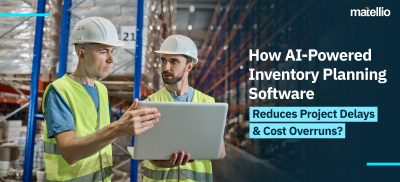
The construction industry is inherently complex, involving numerous stakeholders, fluctuating budgets, and tight deadlines. Traditional management methods often fall short in addressing these challenges, leading to inefficiencies and project delays. To overcome these obstacles, many construction firms are turning to Enterprise Resource Planning (ERP) software. These comprehensive systems integrate various business processes into a unified platform, enhancing efficiency and decision-making.
In this blog, we will explore the significance of ERP software in the construction sector, its key features, benefits, and how to select the best solution for your business needs.
Challenges in the Construction Industry
The construction sector faces several challenges that can hinder project success:
- Fragmented Communication: Disjointed communication channels can lead to misunderstandings and errors.
- Budget Overruns: Inaccurate cost estimations and unforeseen expenses often result in exceeding budgets.
- Project Delays: Inefficient scheduling and resource allocation can cause significant delays.
- Regulatory Compliance: Navigating complex regulations requires meticulous attention to detail.
Addressing these issues is crucial for maintaining profitability and client satisfaction.
Need for Digital Transformation in Construction
Embracing digital transformation is essential for modern construction companies. Implementing advanced technologies, such as construction ERP software, can lead to:
- Enhanced Productivity: Automating routine tasks allows teams to focus on strategic activities.
- Improved Collaboration: Centralized data facilitates better communication among stakeholders.
- Data-Driven Decisions: Real-time analytics provide insights for informed decision-making.
Partnering with experts in Digital Transformation Consulting can guide construction firms through this transition, ensuring a seamless integration of new technologies.
Overview of ERP Software and Its Growing Importance
ERP software integrates various business functions—such as finance, procurement, project management, and human resources—into a single system. For the construction industry, ERP systems offer:
- Streamlined Operations: Coordinating multiple processes reduces redundancies.
- Resource Optimization: Efficient allocation of materials and labor enhances productivity.
- Regulatory Compliance: Automated tracking ensures adherence to industry standards.
The adoption of ERP solutions is on the rise, with the global construction ERP software market projected to reach $9.3 billion by 2027, reflecting the industry’s commitment to digital advancement.
What Is Construction ERP Software?
Definition and Core Purpose of ERP Systems
Construction ERP software serves as the backbone of modern construction companies, integrating essential business processes like project management, finance, procurement, and resource tracking into a single platform. This unified system provides real-time insights and ensures efficient operations, allowing businesses to tackle challenges with precision and speed.
How ERP Is Tailored for Construction
Unlike general ERP systems, construction ERP systems are specifically designed to address the unique demands of the construction industry. These systems include modules for:
- Project Scheduling and Planning: Tools to keep projects on track and within scope.
- Compliance Management: Ensures adherence to safety and regulatory standards.
- Equipment Tracking: Optimizes the usage of heavy machinery and tools.
- Subcontractor Coordination: Streamlines contracts and progress tracking.
Importance of Customization in Construction ERP
Every construction project is different, and so are the operational needs of businesses. Customizing ERP systems ensures they align with specific workflows and processes. Matellio specializes in delivering Custom ERP Software Solutions that cater to the unique needs of the construction industry, ensuring a seamless fit and maximum ROI.
Streamline Your Construction Projects with Custom ERP Solutions. Project management is critical in construction, where delays can result in massive financial losses. ERP systems include advanced tools for project planning, task delegation, and milestone tracking, enabling managers to oversee all activities in real-time. ERP software simplifies construction accounting by managing budgets, costs, invoices, and payroll through an integrated financial module. Accurate and timely financial reports ensure businesses stay profitable and compliant with regulations. Efficient procurement and inventory management prevent material shortages or excess stock. Construction ERP software tracks orders, optimizes material usage, and minimizes waste, ensuring smooth project execution. Keeping tabs on workforce schedules and machinery utilization is vital in construction. ERP systems monitor employee productivity, manage schedules, and track equipment usage, ensuring maximum resource efficiency. Explore Matellio’s Enterprise Software Development Services for tailored solutions that enhance these functionalities. Construction ERP software promotes collaboration by centralizing all project-related data, ensuring that stakeholders, contractors, and managers are on the same page. Real-time updates eliminate delays caused by miscommunication. By providing clear insights into resource availability, ERP systems help allocate materials, labor, and machinery more effectively. This results in reduced waste and higher productivity. Automated workflows, scheduling tools, and real-time tracking capabilities help avoid bottlenecks, ensuring projects are delivered on time and within budget. With built-in compliance tracking and risk mitigation features, construction ERP systems help firms adhere to industry standards and proactively address potential issues. Matellio’s AI & Machine Learning Solutions can further enhance predictive analytics for risk assessment and management. Cloud-based ERP systems are hosted on remote servers and accessed through the internet, making them a popular choice for construction companies seeking flexibility and scalability. These systems offer unparalleled convenience for businesses managing projects across multiple locations or requiring real-time data sharing among stakeholders. Key Benefits: Limitations: For companies exploring cloud ERP, partnering with Matellio for Cloud Integration Services ensures a secure and seamless transition to cloud-based solutions. On-premises ERP systems are hosted locally within a company’s infrastructure, giving businesses full control over their data and system configurations. While this approach demands more investment upfront, it is ideal for firms with strict data security requirements or those operating in regions with limited internet connectivity. Best Fit For: Drawbacks: Hybrid ERP systems offer the best of both worlds, combining the accessibility of cloud-based solutions with the security and control of on-premises systems. This approach allows businesses to leverage cloud capabilities while maintaining sensitive data on local servers. Advantages: Example Use Cases: By leveraging SaaS Development Services, construction businesses can create hybrid ERP systems that cater to their specific operational needs, balancing flexibility and security. Transform Construction Management with Smarter, Integrated ERP Systems. Selecting the right ERP software for your construction business is a critical decision that can significantly impact efficiency, profitability, and long-term growth. Here’s a comprehensive guide to help you make the best choice: Scalability Customization Construction companies often use a variety of tools, including project management software, procurement systems, and accounting tools. The chosen ERP should integrate seamlessly with these existing systems to avoid data silos and redundant processes. Look for solutions with robust APIs and third-party integrations. Key Questions to Ask: If you’re looking for solutions tailored to your needs, Matellio provides expertise in ERP System Development to ensure smooth integration with your existing tools. Successful ERP adoption depends on the support provided by your vendor during and after implementation. Comprehensive training programs for employees, along with ongoing support, are essential to maximize the ERP’s potential. What to Look for in a Vendor: Matellio’s ERP experts not only design tailored systems but also provide extensive training and 24/7 support to ensure smooth implementation and operation. While the initial cost is a crucial factor, it’s essential to consider the Total Cost of Ownership (TCO), which includes: Generic ERP systems may not offer the industry-specific tools that construction companies require. Look for ERP software with features such as: Matellio specializes in developing Enterprise Software Development Services that include these critical features tailored for the construction sector. When selecting an ERP solution, review case studies and testimonials from other construction companies. These can provide insights into the vendor’s expertise and the effectiveness of their solutions in real-world scenarios. Implementing ERP software in the construction industry involves a strategic approach to ensure seamless integration and maximum efficiency. Below is a detailed step-by-step guide on the process, challenges, and best practices for a successful ERP implementation. Optimize Your Operations with State-of-the-Art Construction ERP Software. Employees may be hesitant to adopt new technology due to fear of complexity or disruption. Comprehensive training and change management strategies can ease this transition. Poor data quality or compatibility issues during migration can delay implementation. Careful planning and data audits are essential to mitigate these risks. The cost of customization, deployment, and training can be significant. However, these investments deliver long-term benefits in efficiency and ROI. Ensuring compatibility between the ERP system and existing tools is critical. Expert Digital Transformation Consulting can help resolve integration challenges. Effective employee training is crucial for successful ERP adoption. Lack of user familiarity with the system can lead to underutilization and resistance. Key training best practices include: By equipping your workforce with the skills to use ERP systems effectively, you can maximize your investment and streamline day-to-day operations. Involve key stakeholders from the beginning to ensure the system meets business needs and garners widespread support. Prioritize customization to align the ERP with your specific workflows, ensuring a smooth adoption process. Collaborate with a vendor experienced in ERP System Development to navigate implementation complexities. Regularly review implementation milestones to stay on track and address challenges proactively. Construction ERP software offers immense value to businesses of all sizes, but the requirements and expectations differ significantly between small and medium-sized businesses (SMBs) and large enterprises. Understanding these distinctions is crucial for selecting and customizing the right ERP system for your construction business. For SMBs, cost-efficiency and ease of use are top priorities. These businesses often require ERP systems that provide essential features without the complexity or high upfront costs of enterprise-grade solutions. Key Features for SMBs: Why SMBs Benefit from ERP Systems: Matellio offers Construction Management Software Development services to create tailored ERP systems that address the specific challenges of SMBs. Large construction enterprises handle complex projects across multiple locations, often involving numerous stakeholders and compliance requirements. These businesses need robust ERP systems with advanced features and the ability to integrate seamlessly with existing tools. Key Features for Enterprises: Why Enterprises Require ERP Systems: Matellio specializes in building Custom ERP Software Solutions for enterprises, offering high-level customization to meet the demands of large-scale operations. SMBs should focus on systems that address immediate pain points, while enterprises should consider long-term scalability and advanced features. SMBs may opt for cloud-based ERP solutions with affordable subscription plans, whereas enterprises can invest in hybrid or on-premises systems for greater control. Both SMBs and enterprises should partner with experienced ERP providers who understand the construction industry’s unique challenges. The construction industry is rapidly evolving, and so are the technologies that support it. Construction ERP systems are no longer limited to streamlining workflows; they now incorporate cutting-edge advancements to address modern challenges and improve decision-making. Here are the key trends shaping the future of construction ERP. Artificial intelligence (AI) and machine learning (ML) are revolutionizing ERP systems by enabling predictive analytics, automating routine tasks, and enhancing decision-making. In the construction industry, AI-powered ERP systems can: With Matellio’s AI & Machine Learning Solutions, construction companies can integrate these advanced capabilities into their ERP systems, staying ahead of the competition. The Internet of Things (IoT) is transforming the construction sector by providing real-time data from connected devices and machinery. IoT-enabled ERP systems allow construction companies to: Matellio’s expertise in Custom IoT Development ensures seamless integration of IoT technologies with construction ERP systems, enabling smarter, data-driven operations. As construction projects become more distributed, cloud-first and mobile-friendly ERP systems are becoming essential. These systems enable project managers and stakeholders to access real-time data and make decisions from any location. Benefits of Cloud-First ERP: Mobile-Friendly ERP Features: With Matellio’s Cloud Integration Services and mobile app development expertise, construction companies can modernize their ERP systems to align with today’s remote working requirements. As sustainability becomes a key focus, ERP systems are incorporating tools to monitor and reduce the environmental impact of construction projects. Features include: By integrating sustainability modules into ERP systems, construction companies can not only meet regulatory requirements but also enhance their brand reputation. Also Read: Explore how tailored retail ERP software solutions can streamline operations, enhance customer experiences, and drive business growth through custom ERP development. Enhance Project Efficiency with Tailored Construction ERP Solutions. Construction ERP software is no longer just a tool—it’s a strategic asset that empowers businesses to manage complex operations efficiently. From improving collaboration and resource utilization to leveraging AI and IoT for smarter decision-making, ERP systems are transforming the construction industry. At Matellio, we specialize in delivering Custom ERP Software Solutions tailored to the unique needs of the construction sector. Whether you’re a small business or a large enterprise, our team can help you implement ERP systems that drive efficiency, sustainability, and growth. Ready to take your construction operations to the next level? Construction ERP software is a centralized platform that integrates various processes like project management, financial tracking, procurement, and workforce management. It helps construction companies streamline operations, improve collaboration, and enhance decision-making by providing real-time data and automation capabilities. ERP software helps construction companies overcome challenges like project delays, budget overruns, and fragmented communication. It ensures efficient resource allocation, automates workflows, and provides accurate financial tracking, making it essential for managing complex construction projects. Key features of construction ERP software include project scheduling and tracking, financial management, procurement and inventory tracking, and workforce and equipment monitoring. These features help streamline workflows, optimize resources, and ensure project success. By automating processes, reducing material wastage, and improving resource utilization, construction ERP solutions minimize operational inefficiencies and delays, leading to significant cost savings. Real-time data and analytics further enable better budgeting and forecasting. Cloud-based ERP systems offer flexibility and remote access, making them ideal for businesses with multiple sites. On-premises ERP provides greater control and security, suitable for companies with stringent data requirements. Hybrid ERP systems combine the benefits of both.Key Features & Benefits of Construction ERP Software

Features
Project Management and Tracking Tools
Financial and Accounting Modules
Procurement and Inventory Management
Workforce and Equipment Tracking
Benefits of Adopting Construction ERP
Enhanced Collaboration Between Teams
Improved Resource Utilization
Reduced Project Delays and Cost Overruns
Better Compliance and Risk Management
Types of Construction ERP Systems

Cloud-Based ERP: Benefits and Limitations
On-Premises ERP: When Is It a Good Fit?
Hybrid ERP Systems for Construction
How to Choose the Best ERP Software
Evaluating Scalability and Customization
Your ERP software should grow with your business. As construction projects scale in complexity, you may need additional features, users, or modules. Opt for a system that can adapt to increased demands without requiring a complete overhaul.
Off-the-shelf ERP systems often fail to meet the unique needs of construction businesses. Customization ensures that your ERP aligns with your workflows, compliance requirements, and project management styles. Matellio’s Custom ERP Software Solutions offer tailored systems that fit the unique challenges of the construction industry. Integration Capabilities with Existing Systems
Assessing Vendor Support and Training
Evaluating Total Cost of Ownership
Industry-Specific Features
References and Case Studies
Implementation Process for Construction ERP
Needs Assessment and Goal Definition
Vendor and System Selection
Data Migration
Customization and Configuration
System Deployment
Employee Training
Testing and Optimization
Go Live and Support
Challenges During ERP Implementation
Resistance to Change
Data Migration Issues
High Initial Costs
Integration with Legacy Systems
Importance of Employee Training and Onboarding
Best Practices for a Successful ERP Implementation
Stakeholder Involvement
Focus on Customization
Partner with Experts
Monitor Progress
Construction ERP for SMBs vs. Enterprises
ERP Features Tailored to Small and Medium Businesses (SMBs)
Scalable Solutions for Enterprise-Grade Requirements
Choosing the Right ERP Based on Business Size
Evaluate Current Needs and Future Goals
Budget Considerations
Vendor Expertise
Emerging Trends in Construction ERP
The Role of AI and Machine Learning in ERP
IoT-Enabled ERP for Real-Time Tracking
Cloud-First and Mobile-Friendly ERP Systems
Sustainable and Green Construction Through ERP
Conclusion
Get in touch with our experts today to build the perfect ERP solution for your business. FAQs for Construction ERP Software
What Is Construction ERP Software and How Does It Work?
Why Do Construction Companies Need ERP Software?
What Are the Key Features of Construction ERP Software?
How Can Construction ERP Solutions Help Reduce Costs?
What Is the Difference Between Cloud-Based and On-Premises Construction ERP Systems?


